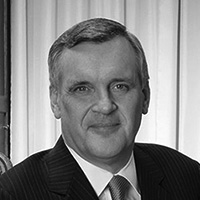Expert Q&A | David C. Onley



Meet schools in person, ask real questions, and find the best fit all in one afternoon.
Private School Expo - Fall 2025 Yes, I want to attend
A: The definition I have been using for accessibility is that which enables people to achieve their full potential. Accessibility is much more than wheelchair parking lots, ramps and things like that. For the 50 percent of people with disabilities in Ontario, some 900,000 people have invisible disabilities—a whole range of significantly limiting conditions, such as depression or diabetes.
The key to accessibility is education or learning more about our differences and about what unites us. It requires an enlightened attitude from educators and the education system. I've been influenced greatly by the 2009 report by the Standing Conference of Canonical Orthodox Bishops of America (SCOBA). The authors point out that the negative side of inclusion is that it can be forced and mandated.
Unless there is a real embracing of it, there can be friction and resentment within groups and the structure itself. So the term they chose to use was "membership." Instead of talking about the differences, the focus was on the commonalities and that you were invited as a member. Using the concepts of membership and unity is a much more effective way of looking at the issue.
A: I would encourage educators to reach out to the private and public sector and make known the success of their students who have disabilities and their potential as good employees. A major problem facing students who are graduating and going into the workforce is attempting to get jobs. The unemployment rate for disabled students and adults in our society is still many times higher than the national unemployment rate. The highest level that the unemployment rate ever reached nationally was during the Great Depression at 24 percent. But the unemployment rate for adults with disabilities in Ontario today is 25 percent. That 25 percent does not include people who have simply given up looking and have perhaps diverted themselves to self-employment or underemployment.
It really does come down to attitude because most of the reasons why employers do not hire people with disabilities are based on a series of myths and misperceptions of capability due to presumed limitations of disability that are readily disprovable.
(Educators) are here to enable all students to achieve their full potential.
In the SCOBA report, they talk about the difference between disability and handicap. Handicap is something that is imposed on people with disabilities by others. And so, for the millions of Canadians who have overcome their disability and lead rewarding and meaningful lives despite the daily adversity, they can only be stopped by the handicap, which is others' biased or discriminatory attitude. Educators should consider how people with disabilities are actually being handicapped with these attitudes.
Schools should ask themselves: Do you see inclusion as the answer, which is something that forces a person to grudgingly follow the rules, or have you created an environment and a culture where people within the context of this school and the administration are seen as valuable because they are members of the team? I think it is important to understand those definitions and then look at the overall purpose of why you are here as educators—you are here to enable all students to achieve their full potential. When you make it a commitment, I think you will see transformation continuing within our school system and transformation that can occur within the rest of society.
Profile of Janice Gruchy, Director of the Academy for Gifted Children - P.A.C.E.
Q&A with Janice Gruchy to learn more about the educational approach at P.A.C.E. (June 12, 2025)
Profile of David Young, Head of St. George's School
It's far more fulfilling for us to send our students off to their next adventure knowing they're going somewhere they want to go. (June 9, 2025)
St. Clement’s Junior School: A community rooted in curiosity, connection, and care
Small class sizes, inquiry-driven learning, and a focus on well-being have created an environment that nurtures confident and curious learners (May 29, 2025)
Building Confidence and Stretching Limits: Advanced Academic Pathways at Hudson College
As math and science fields continue to evolve, especially with the rise of AI and advanced technologies, the demand for skilled STEM graduates grows. (April 29, 2025)
How financial aid availability impacts the school community
What you need to know about the role of financial aid programs in shaping a school's culture (April 7, 2025)